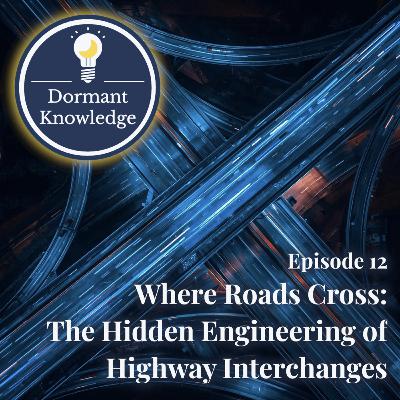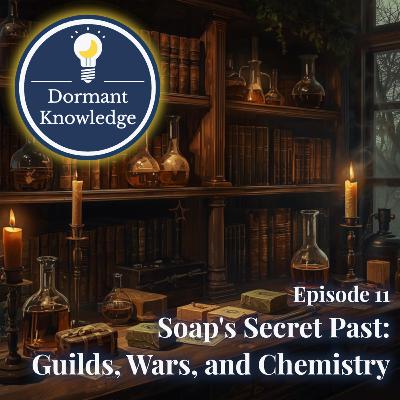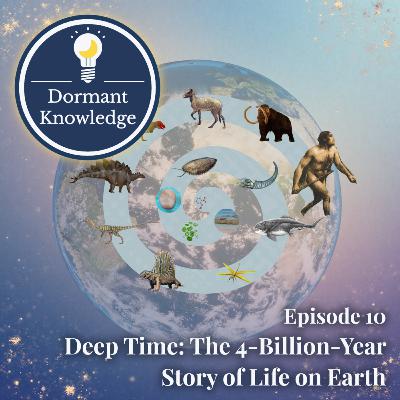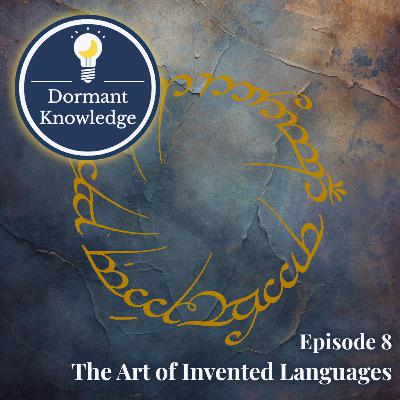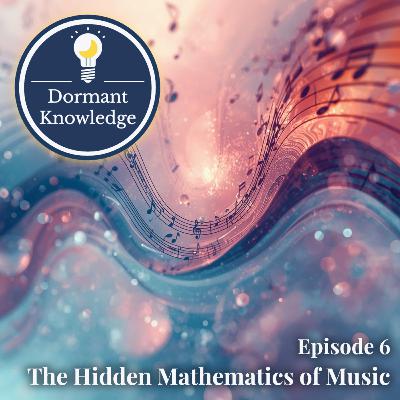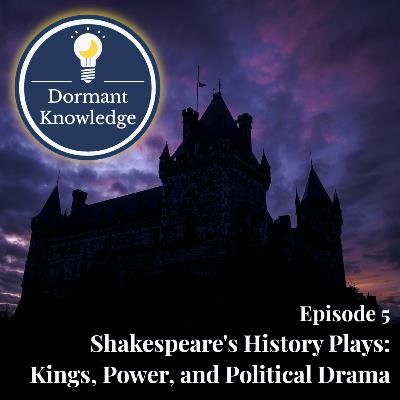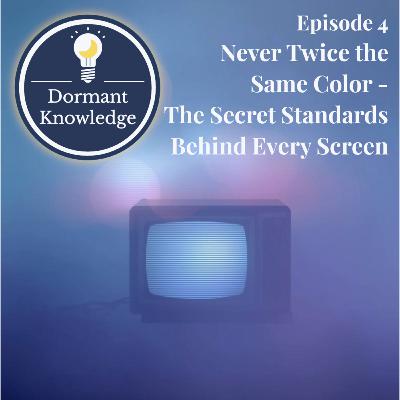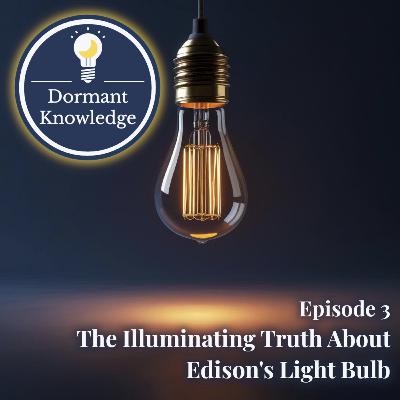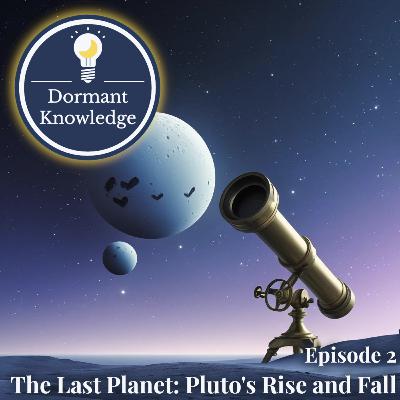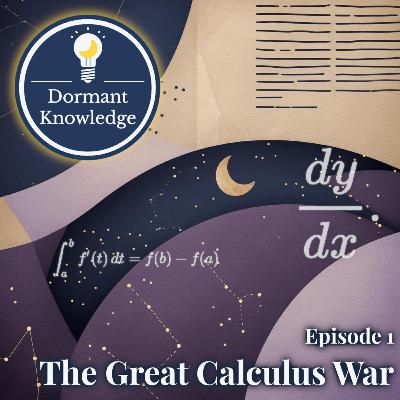Discover Dormant Knowledge
Dormant Knowledge

Dormant Knowledge
Author: Dormant Knowledge
Subscribed: 0Played: 1Subscribe
Share
© Dormant Knowledge
Description
Welcome to Dormant Knowledge, a podcast designed to feed your curiosity while lulling you to sleep. In each episode, we'll take you on a journey through an interesting topic, delivered at a pace that hopefully helps your mind slow down and your eyes grow heavy.
15 Episodes
Reverse
Why do we lose days when calendars change? How did ancient Romans accidentally mess up leap years for decades? And what exactly is a leap second?As we approach another New Year, join Deb for a gentle journey through humanity's long quest to organize time. From the ancient Egyptians' beautifully simple 365-day calendar to the Mayans' multiple overlapping systems, from Julius Caesar's elegant reform to Pope Gregory's controversial fix that made ten days vanish from history.Discover why September is the ninth month when "septem" means seven, how the Islamic calendar cycles through all the seasons, and why computer programmers have nightmares about leap seconds. Learn about the Hebrew calendar's intricate 19-year cycle, Ethiopia's calendar that's 7-8 years "behind" ours, and Samoa's decision to simply skip December 30, 2011.We'll explore the surprisingly complicated calculation of Easter's date, the Y2K bug that wasn't quite as overblown as people thought, and why Britain rioted (maybe) when they lost eleven days in 1752. Plus: calendar reform proposals that would give us identical quarters or 13-month years, and why we'll probably never adopt them.Perfect bedtime learning about the systems that structure our lives—delivered in Dormant Knowledge's signature relaxing style.Topics covered:Egyptian, Babylonian, Mayan, Chinese, and Roman calendar systemsWhy our month names don't match their numbersJulius Caesar's reform and the Julian calendarThe Gregorian calendar reform of 1582Islamic, Hebrew, Persian, and Ethiopian calendars still in use todayThe complicated rules of leap years (and why 2000 was special)Leap seconds and why they crash computer systemsThe International Date Line and its quirksFailed calendar reform proposals throughout historyWhether you drift off after ten minutes or stay awake through the whole episode, you'll come away with a deeper appreciation for the intricate systems humans have created to measure our journey through time.Dormant Knowledge is the educational sleep podcast for curious minds. Learn something fascinating while you fall asleep.
Journey through humanity's oldest celebration as we explore winter solstice traditions from around the world. In this peaceful episode perfect for falling asleep, discover how ancient cultures marked the longest night of the year—and why their rituals still resonate today.What is the winter solstice? It's that precise astronomical moment when the Northern Hemisphere tilts furthest from the sun, giving us our longest night and shortest day. But for thousands of years, it's meant so much more than just a date on the calendar. It's been a time of hope, celebration, and the promise that light will return.We'll visit the 5,000-year-old passage tomb at Newgrange in Ireland, where the rising sun illuminates a dark chamber for just 17 minutes on solstice morning. We'll explore Stonehenge and the evidence of massive midwinter feasts held 4,500 years ago. We'll discover how the Germanic peoples celebrated Yule with evergreens and Yule logs—traditions that survive in modern Christmas celebrations.Travel to ancient Rome for Saturnalia, when social rules were turned upside down and masters served their slaves. Experience the Persian festival of Yalda, where families gather to read poetry and eat pomegranates through the longest night. Learn about Chinese Dongzhi, when families reunite to make and share tangyuan dumplings, and Japanese Toji, where people soak in yuzu-scented baths for good health.Along the way, we'll explore why humans across vastly different cultures developed remarkably similar responses to this astronomical event: lighting fires, decorating with evergreens, feasting together, and creating rituals around the return of light. We'll discover how many Christmas traditions—from decorated trees to gift-giving to festive meals—have their roots in ancient solstice celebrations.This episode is designed to be both genuinely educational and deeply relaxing. Whether you listen all the way through or drift off somewhere in the middle, you'll absorb fascinating stories about how our ancestors understood the cosmos, marked time, and found hope in the darkest season.Perfect for curious minds who want to learn while falling asleep.Episode Length: ~49 minutesTopics: Winter solstice, ancient astronomy, cultural traditions, Yule, Saturnalia, Newgrange, Stonehenge, seasonal celebrations, history of ChristmasFind more episodes at dormantknowledge.comFollow us: @dormantknowledge (Instagram/Facebook) | @drmnt_knowledge (X)
Ever wondered about those massive concrete structures where highways loop, merge, and stack on top of each other? Tonight, we're exploring the surprisingly fascinating world of highway interchanges—the engineering marvels you've driven through hundreds of times without a second thought.Discover the elegant cloverleaf designs of the 1920s, the towering five-level stacks of modern cities, and the innovative diverging diamond interchanges that briefly move you to the "wrong" side of the road. Learn why early traffic engineers faced a critical problem: how to let high-speed traffic cross paths without anyone stopping, and why their solutions—from New Jersey's pioneering cloverleafs to Los Angeles's billion-dollar spaghetti junctions—shaped American cities and suburbs.We'll explore the "weaving problem" that plagued early designs, the controversial legacy of builder Robert Moses, and what the future holds for these monuments to automobile culture in an era of autonomous vehicles and changing transportation priorities.Perfect for curious minds who love learning about the hidden complexity of everyday infrastructure. Settle in and drift off as we unravel the loops, levels, and logic of highway interchanges.Dormant Knowledge is the educational sleep podcast for curious minds. Learn something fascinating while you fall asleep.Visit dormantknowledge.com | Follow @dormantknowledge (Instagram/Facebook) or @drmnt_knowledge (X)
Did you know that soap was once taxed as a luxury item? Or that it played a crucial role in WWI ammunition production? Journey through 5,000 years of surprisingly dramatic soap history in this fascinating episode of Dormant Knowledge.From ancient Babylonian clay tablets describing the first soap recipes to medieval guilds guarding their trade secrets, from the chemistry of saponification to modern environmental concerns, discover how this everyday item has shaped civilization in unexpected ways. Learn why the Romans preferred oil and scrapers to soap, how soap-making guilds operated like medieval tech companies, and why understanding soap chemistry helped us combat COVID-19.Deb explores the molecular magic of how soap actually works, the industrial revolution that made it affordable, and the craft soap renaissance bringing artisanal techniques back into vogue. Perfect for anyone who's ever wondered about the science behind getting clean or the hidden history in their shower.Sweet dreams and sudsy knowledge await in this gentle deep-dive into one of humanity's most essential inventions.Learn more at dormantknowledge.comFollow: @dormantknowledge#SleepPodcast #Educational #History #Science #Chemistry
Journey through 4.6 billion years of Earth's history, from the first self-replicating molecules to the rise of human consciousness. In this episode, Deb explores the vast timeline of biological epochs: the Hadean's hellish beginnings, the Great Oxidation Event that poisoned Earth's early atmosphere, the Cambrian explosion of complex life, mass extinctions that reset evolution's clock, and the improbable series of events that led to us.Discover how single-celled organisms transformed our planet's chemistry, why the "boring billion" years weren't boring at all, and how life repeatedly found ways to flourish after catastrophic extinctions. From stromatolites to dinosaurs, from the first flowers to the rise of mammals, we'll trace life's epic journey through deep time.Perfect for anyone curious about evolution, geology, or our place in the grand story of life on Earth. Let the immense scales of geological time and the resilience of life gently carry you off to sleep.Sweet dreams and curious nights from Dormant Knowledge.
Journey into the strange and revolutionary world of quantum physics, where particles behave like waves, cats exist in multiple states at once, and the very act of observation changes reality.In this episode of Dormant Knowledge, the educational sleep podcast for curious minds, host Deb explores the Quantum Century, the remarkable era when physicists upended everything we thought we knew about the universe. From Max Planck's desperate solution to a stubborn physics problem in 1900, to Einstein's Nobel Prize-winning explanation of light, to Niels Bohr's impossible atom, discover how quantum mechanics emerged from a series of bewildering experimental results that refused to make sense.What You'll Learn:✨ How Max Planck accidentally launched quantum theory while trying to explain why heated objects glow the colors they do✨ Why Einstein's photoelectric effect (not relativity) won him the Nobel Prize, and what it revealed about the nature of light✨ The mind-bending double-slit experiment that proved light and matter can be both particle and wave simultaneously✨ How Niels Bohr created an atomic model where electrons make impossible quantum leaps between energy levels✨ The famous Einstein-Bohr debates that questioned the very nature of reality✨ Schrödinger's cat and what this thought experiment reveals about quantum superposition✨ Heisenberg's uncertainty principle and why we can never know everything about a particle✨ How quantum entanglement creates "spooky action at a distance" that troubled Einstein✨ The Copenhagen interpretation and what it means that observation collapses quantum possibilities into realityThis episode gently guides you through the revolutionary discoveries of Planck, Einstein, Bohr, Heisenberg, Schrödinger, and others who transformed our understanding of the atomic world. Learn about the famous Solvay Conferences where the greatest minds in physics gathered to debate these strange new ideas, the thought experiments that challenged our intuitions, and why quantum mechanics, despite its philosophical puzzles, remains the most successful scientific theory ever created.Perfect for falling asleep while absorbing fascinating physics, understanding the foundations of modern technology, or simply wondering about the strange quantum world underlying everything we see.Whether you drift off somewhere in the middle or make it to the end, you'll come away with a deeper appreciation for the quantum revolution that defined the 20th century and continues to shape our 21st.Dormant Knowledge: Where curiosity meets sleep, and learning happens in the spaces between waking and dreaming.dormantknowledge.com@dormantknowledge (Instagram/Facebook) | @drmnt_knowledge (X)
Tonight, journey into the fascinating world of constructed languages—the carefully crafted tongues that bring fictional worlds to life. From Tolkien's melodic Elvish to the warrior speech of Klingon, discover how brilliant linguists have created entire communication systems from scratch.In this episode of Dormant Knowledge, Deb explores the art and science behind fictional languages, revealing how J.R.R. Tolkien revolutionized the field by approaching language creation like a historical linguist working backwards. Learn about the Sapir-Whorf hypothesis and how different languages might actually shape the way we think, dive into the cultural embedding of Dothraki and High Valyrian, and discover why some made-up languages thrive while others fade away.Whether you're curious about the academic discipline of "artlanging," fascinated by fan communities that expand fictional vocabularies, or simply wondering how someone creates a language that feels real, this gentle exploration will guide you through the remarkable human drive to communicate in entirely new ways.Perfect for falling asleep to fascinating stories about linguistic creativity, cultural psychology, and the boundless possibilities of human communication.
That yellow pencil on your desk looks simple enough - just wood, graphite, metal, and rubber. But economist Leonard Read's famous 1958 essay "I, Pencil" revealed a startling truth: no single person on Earth actually knows how to make one from scratch.Tonight, we explore Read's influential essay about the miraculous complexity hidden in everyday objects, then follow the adventures of two determined individuals who decided to test his theory in the real world. Andy George spent six months and $1,500 trying to make a simple sandwich from scratch - growing wheat, raising chickens, even boiling seawater for salt. Thomas Thwaites attempted something even more ambitious: building a toaster from raw materials, which led him to abandoned mines across Britain and a backyard smelting operation that alarmed the neighbors.Their discoveries reveal profound truths about human cooperation, the limits of individual knowledge, and the invisible networks that make modern life possible. What starts as a story about pencils becomes a meditation on interdependence, expertise, and the beautiful complexity that surrounds us every day.Perfect for curious minds who want to drift off while pondering the miracle of spontaneous coordination that puts simple tools in our hands.
Why does a piano sound different from a violin playing the same note? How do we decide what sounds "right" and what sounds "wrong"? Tonight, we explore the fascinating world of tuning systems—the mathematical compromises that shape every piece of music you've ever heard.Journey back 2,500 years to Pythagoras, who discovered that simple mathematical ratios create beautiful musical intervals. But his "perfect" system had a problem: it was mathematically impossible to make every interval sound good in every key. This led to centuries of creative solutions, cultural variations, and ultimately, the "great compromise" that became our modern musical standard.Discover how different cultures approached the same mathematical puzzle in radically different ways. Arabic music embraced quarter-tones that don't exist on Western instruments. Indian classical music developed 22 microtonal intervals per octave. Indonesian gamelan orchestras created tuning systems so unique that each ensemble became its own musical universe.Learn about the keyboard crisis that drove European instrument makers to desperate measures—organs with 19 keys per octave, split black keys, and other musical nightmares. Follow the story of how Bach's "Well-Tempered Clavier" helped convince the world to accept mathematical imperfection in exchange for musical freedom.Explore how colonial expansion and recording technology spread equal temperament globally, nearly erasing centuries of microtonal traditions. Then discover how digital music is creating a renaissance of alternative tuning systems, from historically authentic performances to completely invented scales that divide octaves into 31, 53, or any number of parts.From the physics of sound waves to the psychology of musical perception, from ancient Greek mathematics to modern xenharmonic experiments, this episode reveals how every song you've ever loved represents centuries of human ingenuity wrestling with the beautiful impossibility of making mathematics and music work together perfectly.Perfect for: Anyone curious about the hidden science behind music, the cultural diversity of musical systems, or how mathematical principles shape artistic expression.
Journey into the fascinating world of Shakespeare's history plays, where medieval English kings come alive through political intrigue and timeless human drama. Discover how William Shakespeare transformed dry historical chronicles into compelling theatrical masterpieces featuring unforgettable characters like the villainous Richard III, the heroic Henry V, and the anarchic Sir John Falstaff.Explore how Shakespeare wrote these plays in reverse chronological order, working backwards from dramatic moments to uncover their origins. Learn about the remarkable 2012 archaeological discovery of Richard III's remains under a Leicester car park, and how it confirmed some aspects of Shakespeare's portrayal while challenging others.From Margaret of Anjou's evolution from princess to political warrior, to Prince Hal's transformation from tavern companion to ideal king, these plays reveal the psychological complexity behind political power. Perfect for curious minds who want to absorb fascinating knowledge about literature, history, and human nature while gently drifting off to sleep.Topics covered: Shakespeare's writing process, the Wars of the Roses, archaeological discoveries, medieval kingship, character psychology, and the timeless themes of power and ambition that still resonate today.Perfect for: Literature enthusiasts, history buffs, and anyone who loves learning while falling asleep.
Why does your TV screen have those exact proportions? Why do old movies sometimes look slightly "off" when you're watching them? Tonight, Deb explores the fascinating invisible infrastructure that shapes every single thing you see on any screen—the secret world of television broadcast standards.Discover the surprising political drama behind NTSC, PAL, and SECAM—the three competing systems that divided the world into incompatible television zones. Learn why American engineers joked that NTSC stood for "Never Twice the Same Color," how the Cold War influenced which countries adopted which standards, and why a tiny shift from 30 to 29.97 frames per second still affects your Netflix viewing today.From mechanical spinning disks in the 1920s to today's 4K streaming, this is the story of how technical decisions made in small committee rooms ended up shaping global culture in ways most people never realize. Whether you drift off learning about phosphor chemistry or stay awake for the digital revolution, you'll never look at your screen the same way again.Perfect for curious minds who love learning about the hidden engineering marvels that surround us every day.Dormant Knowledge: Learn something fascinating while you fall asleep.
Tonight on Dormant Knowledge, we explore one of history's most iconic inventions. But the story of Edison's light bulb is far more complex than the simple myth suggests.Join host Deb as we illuminate the fascinating truth behind Thomas Edison's greatest triumph. Discover why Edison tested over 3,000 different materials, from platinum to bamboo, in his quest for the perfect filament. Learn about the brilliant competitors like Joseph Swan and Nikola Tesla who were solving the same problems independently. And uncover the ruthless business tactics Edison used in the famous "War of Currents" against alternating current power.This isn't just the story of a single invention; it's the tale of how Edison created the entire electrical utility system that powers our modern world, transforming human civilization from a daylight-dependent society to one that never sleeps.Drift off while discovering the science of incandescence, the engineering marvels of Menlo Park, and the collaborative genius behind what we think of as Edison's solo achievement. From gaslight to electric light, this is the illuminating journey that changed everything.Perfect for curious minds who love learning while falling asleep. Sweet dreams, and may your rest be as brilliant as Edison's breakthrough.
In 1930, a 24-year-old farm boy from Kansas made one of astronomy's most captivating discoveries—a tiny, distant world at the edge of our solar system. For 76 years, Pluto held the title of our ninth planet, capturing imaginations and inspiring wonder about the cosmic frontier.Tonight's episode follows the remarkable story of Clyde Tombaugh's methodical search through millions of stars, guided by mathematical predictions that traced back to the same calculus revolution we explored in Episode 1. Using a "blink comparator" and extraordinary patience, Tombaugh spotted the faint dot of light that would become the most beloved celestial object in our solar system.But Pluto's story didn't end with discovery. We'll explore how an 11-year-old girl from Oxford named this distant world, how our understanding of it evolved from Earth-sized planet to tiny ice ball, and why the 2006 decision to reclassify it as a "dwarf planet" sparked passionate debate that continues today.From the loneliness of the night shift at Lowell Observatory to the stunning heart-shaped plains revealed by NASA's New Horizons mission, Pluto's tale is one of human curiosity, scientific evolution, and our changing relationship with the cosmos. It's the perfect story for minds ready to drift toward sleep while pondering the mysteries at the edge of everything we know.Whether you stay awake for the full journey to the outer solar system or drift off while imagining Pluto's slow dance with its moon Charon, you'll absorb something wonderful about discovery, determination, and the ever-changing nature of scientific understanding.Sweet dreams, space explorers.
The Great Calculus WarWho really invented calculus? Tonight, we explore one of mathematics' most fascinating controversies—the bitter rivalry between Isaac Newton and Gottfried Leibniz over credit for developing calculus.Discover how a brilliant young Newton developed his "method of fluxions" in secret, why Leibniz's approach was actually more elegant, and how their dispute divided European intellectuals for decades. We'll meet the colorful characters caught in the middle, explore the politics of 17th-century academia, and uncover how this mathematical feud shaped the way we think about scientific discovery itself.Along the way, you'll learn why calculus was such a revolutionary breakthrough, how it unlocked the secrets of motion and change, and why this 300-year-old argument still matters today. Perfect for drifting off while absorbing some genuinely fascinating intellectual history.Sweet dreams, and welcome to Dormant Knowledge—where learning happens while you rest.
Welcome to Dormant Knowledge, the podcast where learning meets relaxation. I'm your host Deb, and I'm here to share fascinating topics in a way that's perfect for winding down at the end of the day.Ever wished you could absorb interesting knowledge while drifting off to sleep? That's exactly what Dormant Knowledge is designed for. Whether you're someone who struggles to quiet your mind at bedtime, or you simply want to make the most of those drowsy moments, this show offers something different – genuine educational content delivered at a pace that promotes rest rather than demanding your full attention.In this introductory episode, I'll walk you through what makes this podcast unique. I'll talk about why we created this podcast and how the structure of the show will help you absorb some interesting information while slowly drifting off to sleep.In later episodes, we'll explore topics ranging from mathematical breakthroughs and astronomical discoveries to forgotten historical events and scientific mysteries. Each episode dives deep into subjects that are genuinely fascinating but presented in a conversational, unhurried way – like having a knowledgeable friend share interesting stories while you both relax.You'll notice natural speech patterns, the occasional pause, and ambient sounds that create an authentic, cozy atmosphere. This isn't about cramming information or testing your retention – it's about letting curiosity and rest coexist peacefully.So get comfortable, dim the lights if you'd like, and let's begin this journey into the world of Dormant Knowledge. Sweet dreams, and happy learning.Perfect for: bedtime listening, meditation wind-down, background learning, or anyone who wants to feed their curiosity without the pressure of active study.




